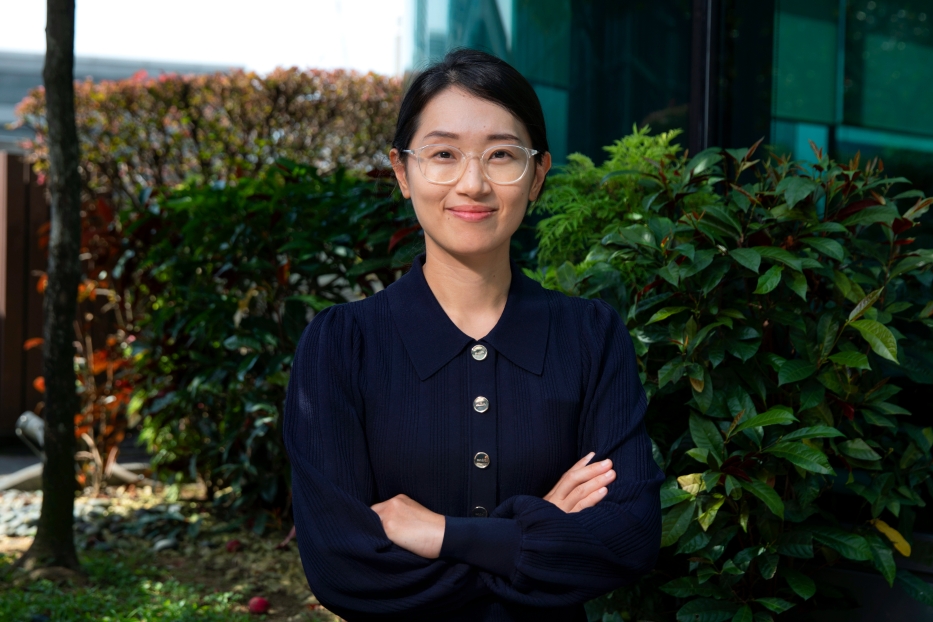Prof Sunha Myong

Feature on Sunha Myong, Assistant Professor of Economics
School of Economics, Singapore Management University
Appointed from July 2016 – August 2025
Pursuing an even playing field for education investment
Assistant Professor Sunha Myong aims to give children more equitable education opportunities through understanding how families invest in their education.
Why does inequality between wealthy and poor families persist across generations? This question deeply intrigues Assistant Professor Sunha Myong, and drives her research into how families invest in their children’s education.
While societies have made substantial progress in providing equal education opportunities to everyone, Myong notes that various frictions in the market and factors like family background can be a hindrance in making optimal investments in education. As such, her research tackles policies and mechanisms that can reduce the inequalities associated with these frictions.
“Understanding the role of education policy in social mobility is crucial to addressing inequality,” says Myong, citing the influential work of Nobel Laureate Gary Becker, father of the theory of human capital. This theory says that the most important driver of a person’s success is investment in their skills.
Researching how people invest in their human capital is just as important as research into financial investments. Most intriguing is that these fateful investment choices are made by parents and families based on matters that are out of their control or conscience. This is where we can uncover clues about social mobility. “Why do wealthy and poor families invest differently in children's education? Economics provides some answers, which in turn help us to judge the acceptable level of inequality in education outcomes,” explains Myong.
If inequality results from people of greater ability getting better “marginal returns” from educational investments, then we might accept that a better outcome for those people is fair. “But we should not accept inequality that results from poor financial resources or misguided parental choices,” says Myong.
Finding hidden barriers
Economic data are valuable in promoting good education choices, says Myong, who likens the problem to financial markets. “In a ‘perfect market’, a student could say, ‘I want to invest this much because I can achieve this much’ and then borrow against their future income,” she says. “But the market is not perfect—there are barriers. I use data to test what factors these barriers are related to.”
Policy makers also want to identify and understand the barriers, so they can know whether their polices, such as loans and scholarships, address those barriers.
In the study Self-financing, Parental Transfer and College Education, Myong and fellow SMU Assistant Professor Jungho Lee, found that policies that restrict student loans to tuition costs, and not other costs associated with study, pushed students into work that compromised the investment on their education. According to Myong, this is a significant barrier.
“Investment in human capital is not only about money but also time and effort. If we look at who works more hours, it is students with fewer financial resources, especially from parents. This is another way that inequality persists to over generations,” she says.
To that end, Myong suggests that student loans should cover other costs besides tuition, and that other ways be found to reduce students’ working hours.
“Students work because they need the money, not because they want to. If we can change the policies, we can redirect students’ time and effort back into their education,” she says.
More childcare sharing, more babies
Another area of Myong’s research with policy implications for human capital looks at earlier in the investment cycle: the impact of gender roles on fertility patterns. Low birth rates are common among Asia’s developed economies, with Singapore, South Korea, Hong Kong and Taiwan all having low fertility rates, in spite of significant efforts to boost birth rates. This is another area where Myong applies economics to understand family decision making.
“Standard economic theory tells us that opportunity cost in terms of salary affects childcare decisions. In Western society, highly educated women spend less time on childcare than other women. But in East Asian societies education has little impact on decisions about who will look after the children. Highly educated females in East Asia spend as many hours on childcare as those with less education.”
The difference may be due to gender norms about caring for children, according to the findings of Myong’s study, Social Norms and Fertility, which she undertook with international collaborators. “In those four countries, wives shoulder 80 percent of childcare, in comparison to 60 percent in Western countries,” she explains. Women who can expect to drop their career for several years are facing a big opportunity cost that traditional fertility policies may fail to counter.
“Given such gender norms, childcare subsidies may not lead to more children, unless fathers pick up a greater share of childcare,” says Myong. “We have to acknowledge the interactions between social norms and economic decisions to understand what is going on within a family and to design effective policies; otherwise, we might waste a lot of resources without any impact or change to show for it.”
Cultivating a vibrant academic culture
Speaking of investment in her own human capital, South Korea-born Myong says she was drawn to SMU by its thriving research environment, which she describes as enriching for an early-career researcher like herself, especially as SMU attracts many distinguished seminar speakers and visiting scholars.
“We have gained valuable feedback from these visiting scholars as they commented on our research work when it was still in the early stages,” she says.
Myong is already having a positive impact on the younger generation herself. She teaches economic development in Asia, where she relishes learning from the students’ perspectives which they gain from investigating case studies about poverty and economic policies in Asia.
“It’s very fulfilling to share my ideas in a real-world context and see the practical policy implications emerge,” Myong concludes.